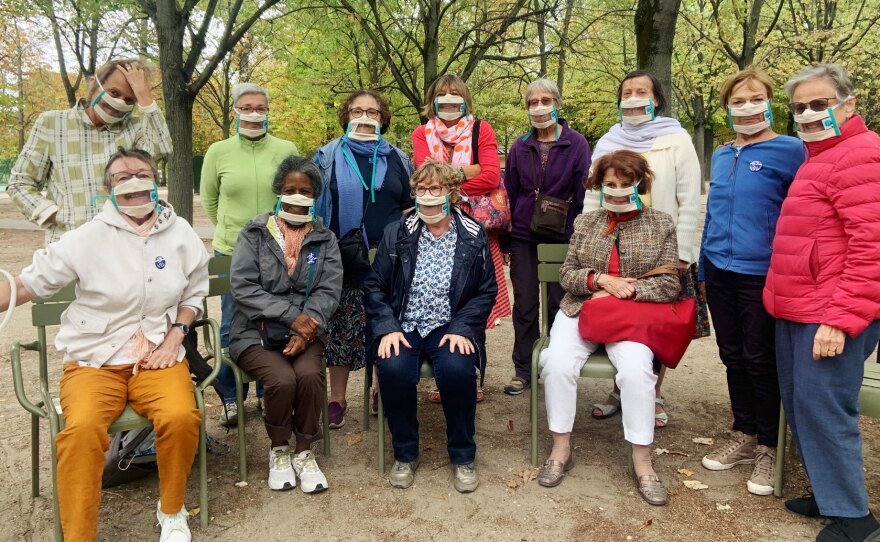Suzy Margueron, a retiree in Paris, usually walks five miles a day, so she knew something was wrong when she barely had the energy to make it to the grocery store in the spring. As it turned out, she was infected with COVID-19. She spent a week collapsed on her couch in March.
Even after recovering, the effects of the pandemic continue to create particular challenges for her. That's because Margueron lost nearly all of her hearing as a young woman — and trying to communicate with people wearing face masks makes daily life exceedingly difficult.
"It's a drama for all the hard-of-hearing people," she explains. "I can hear your voice and understand you if I can read your lips. But if you have a mask, I can't understand anything. It's horrible. I must guess. All the time, I must guess."
Face masks are now ubiquitous in France. They're mandatory indoors and outside in many cities like Paris. Masks have proven effective in stopping the spread of the coronavirus. But they make everyday tasks like grocery shopping challenging for people who are deaf and hard of hearing. Most communicate via written and spoken French, as opposed to a much smaller number who rely on sign language.
With 6 million people — some 10% of the population — malentendant, or hard of hearing, in France, the government has been pushing to find a solution.
Since the spring, the government has encouraged companies to produce more transparent masks, and in some cases has subsidized some of the cost difference between making a regular mask and a transparent mask.
In her office, Sophie Cluzel, the secretary of state in charge of disability issues, demonstrates one of the transparent masks whose production the government is encouraging. The protection, also known in France as an "inclusive mask," consists of a clear plastic panel stitched between two pieces of fabric. Breathable material covers the nostrils, but the mouth is visible.
"It's a protection, but it's also a communication tool," Cluzel tells NPR. "And now we have three that have passed all the tests and can be produced in France. Like this, we can equip, for example, teachers who have deaf pupils — or speech therapists, they need it. But they're also good just to see the smile, for example, when you're an old person."
Cluzel says for now, the transparent masks are expensive — around $12 each — but they can be washed 25 times. And when production increases, she says, prices will come down. The French government hopes that 100,000 masks will soon be produced every month.
Since the first days of the pandemic, when the country did not have enough masks, gowns and other personal protective equipment, the French government has made it a priority to keep control over the production of sanitary supplies.
Margueron, who advocates for people like herself with hearing loss, likes to gather with friends in Paris' Luxembourg Gardens, where they can take off their masks and speak freely.
On a recent day, they recount the difficulty of life with face masks. Françoise de Brugada says even health care professionals like pharmacists sometimes refuse to lift their masks, even though they are behind a protective plastic barrier.
Brugada says difficulties in comprehension are not just about reading lips.
"It's all the muscles of the face, and the eyes and the nose and the expressions," she says. "You can see all that moving, and it makes you understand much more."
Everyone in this group in the Luxembourg Gardens has a transparent mask. But they say it's others who need to wear them.
Christophe Bertrand is trying to make that happen with an affordable see-through mask. His Simon company, which normally produces other plastic products such as cases and folders, has patented a transparent mask with prices ranging between 25 cents and 40 cents each.
Bertrand has sold 25,000 transparent masks to customers in France, and is waiting for European Union health standards approval to market the masks worldwide.
The mask, he says, is made of one sheet of transparent plastic. "The advantage to be manufactured out of only one single material is that our mask is also recyclable," he says.
Bertrand believes that see-through masks can be an advantage for everyone. By allowing people to see each other's faces, he says, these masks help maintain the human connection needed to get through this pandemic.
Copyright 2020 NPR. To see more, visit https://www.npr.org.






